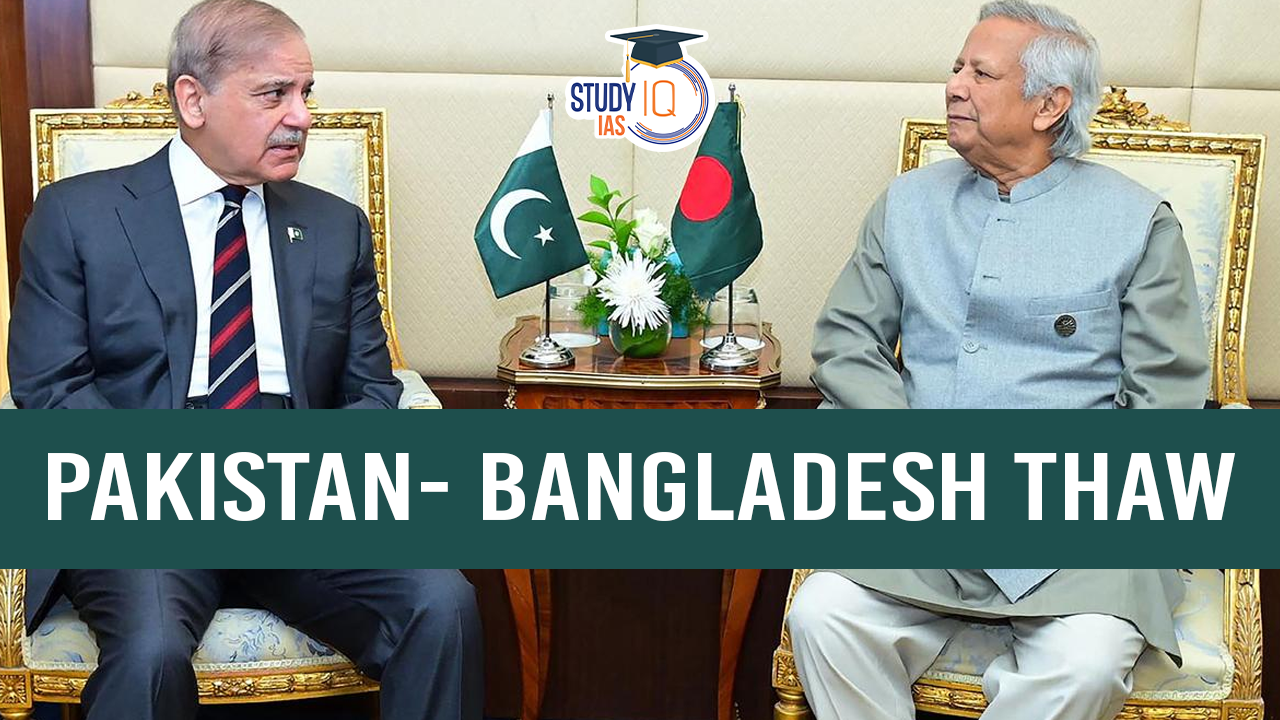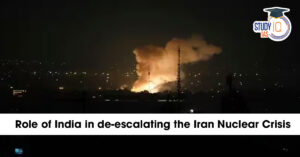Table of Contents
Context: The emergence of Muhammad Yunus as Chief Adviser to the interim Bangladesh government has led to renewed interactions with Pakistan.
Bangladesh-Pakistan Relation Background
- Bangladesh’s independence from Pakistan in 1971 resulted in strained bilateral relations, with historic grievances acting as a major barrier to reconciliation.
- Sheikh Hasina’s tenure (15 years) saw frosty ties with Pakistan, worsened by her pro-India stance and her family’s history with the Pakistani ruling elite.
- 2016 diplomatic tensions: Both countries expelled diplomats, highlighting deteriorating relations.
Recent Developments in Pakistan- Bangladesh Relation
- Bangladesh hosted a high-level Pakistani military delegation in Rangpur.
- A visit by Lieutenant-General S.M. Kamr-ul-Hassan, the Bangladesh Army’s second-in-command, to Rawalpindi to meet with Pakistan’s Army, Navy, and Air Force chiefs.
- Resumption of direct flights between Dhaka and Islamabad.
- Bangladesh’s participation in Pakistan’s Aman 2025 naval exercises in the Arabian Sea, including the deployment of a major Bangladeshi warship to Pakistan for the first time in over a decade
Underlying Factors Driving the Shift
- Anti-India Sentiment: Politics in both Bangladesh and Pakistan are riding on a general anti-India sentiment.
- Diversification of Foreign Policy: Dhaka intends to diversify its foreign policy trajectory in the subcontinent.
- Search for New Allies: Bangladesh is in search of a new form of nationalism, a new form of government, and new allies.
- Reduced Demand for Apology: Muhammad Yunus has watered down Dhaka’s demand for Pakistan to apologize for the “1971 genocide,” now seeking a “resolution of the issues”.
- Economic Considerations: Pakistan aims to increase annual trade with Bangladesh to more than four times the current level within a year. Bilateral trade increased by an estimated 27%t between August and December 2024.
Ground Realities and Challenges
- Public Opinion in Bangladesh: Many Bangladeshis still view the separation from Pakistan as a cornerstone of their national identity, making substantial diplomatic progress challenging without addressing this historical grievance.
- The scars of the 1971 Liberation War define the relationship between Pakistan and Bangladesh. The atrocities committed by the Pakistani military left an indelible mark on Bangladesh’s national consciousness.
- Limited Gains from Pakistan: A partnership with Islamabad offers limited strategic and economic gains for Dhaka, given the misalignment between the economic realities of both countries.
- Geographical Separation: The geographical separation of Bangladesh and Pakistan by Indian territory creates connectivity and political hurdles for smooth trade.
Implications for India
- Countering India’s Influence: The diplomatic maneuvers are perceived as Pakistan’s efforts to counter New Delhi’s faltering influence in Dhaka after Ms. Hasina’s ouster.
- Growing List of Hostile Neighbors: With the count of hostile neighbors now growing, which includes the Maldives and Nepal’s increasing alignment with China, New Delhi has a new cause for concern.
- Potential Axis: There is scope for an axis involving Bangladesh, China, and Pakistan.
- Security Concerns: Security in its northeast States is a concern for India.
India’s Approach
- Understanding Economic and Geographical Realities: India should ground its approach in an understanding of the economic and geographical realities.
- Economic Dependence: Bangladesh will find it challenging to adopt an overtly anti-India stance, given its geographic proximity and economic dependence on India.
- In 2023, Indian exports to Bangladesh were $11.25 billion, while Bangladesh’s exports to India stood at approximately $2 billion.
- Vigilance and Red Lines: India must remain vigilant and clarify its red lines with Bangladesh in critical areas such as terrorism, weapons trade, joint military drills, and maritime security.
- Constructive Engagement: New Delhi should constructively engage with Bangladesh, emphasizing people-to-people contacts, cultural exchanges, and developmental projects. Both countries must continue cooperation on border trade and smuggling, water sharing, and refugee concerns.
- Addressing Sentiments: New Delhi needs to proactively address prevailing anti-India and anti-Hindu sentiments in Bangladesh and capitalize on its economic engagement to reinforce its ties with Dhaka.
- Maintaining a constituency that is favorable to India within Bangladesh remains crucial for long-term strategic stability


 Iran Nuclear Crisis and India’s Role f...
Iran Nuclear Crisis and India’s Role f...
 H1B Visa Program, Beneficiaries, Eligibi...
H1B Visa Program, Beneficiaries, Eligibi...
 Comparison Between India & France's ...
Comparison Between India & France's ...

























